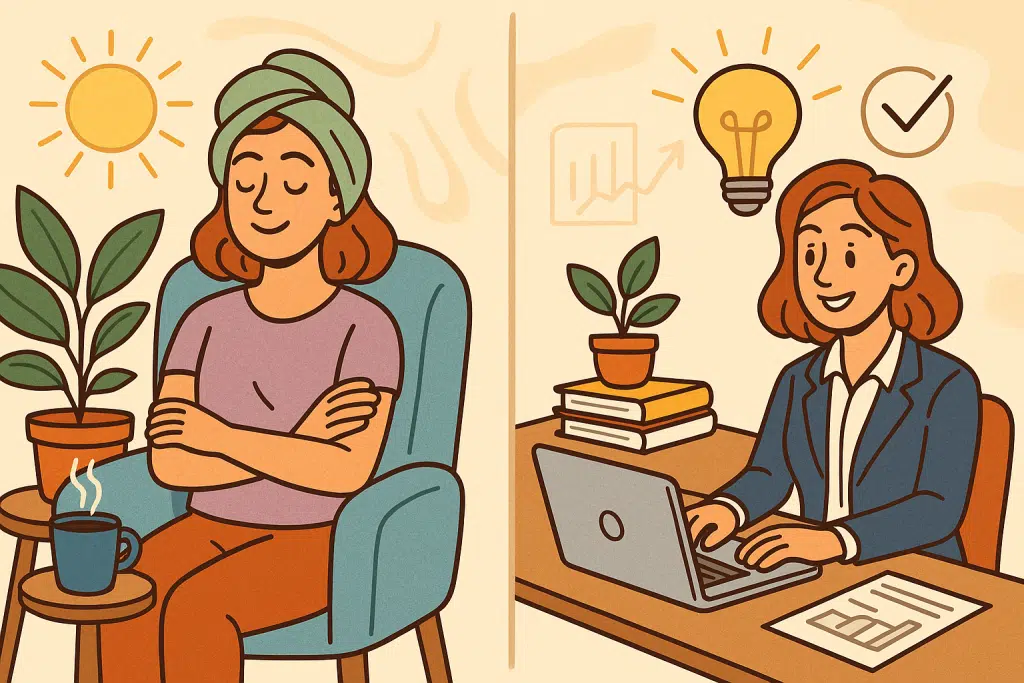How Self-Care Boosts Your Professional Performance
Isabella Lewis August 13, 2025
Self-Care Boosts Your Professional Performance—say that out loud. Feels like a humble brag, but trust me, there’s science behind the glow-up. In 2025, self-care isn’t just bubble baths and cozy nights. It’s about AI nudges, strategic “me time,” and recovery cultures that’ll actually make your work brain shine.
Let’s unpack why investing in your well‑being is one of the smartest career moves you’ll make this year.

What’s Hot in Self-Care for 2025?
1. Recharge Days & Recovery as a Strategy
Remember when self-care meant a weekend spa binge? Not anymore. Employers are now building mental health days and recharge policies into their cultures—not just as perks, but as productivity boosters.
- IHG offers three “recharge days” per year.
- ServiceNow gives six wellbeing days.
- HP provides a yearly “me day.”
These are real investments to help you actually reset so your brain doesn’t bail on you mid‑week.
Meanwhile, the idea of “recovery in the workplace” is trending, with companies offering on‑site nap spaces, mental health days, and digital detox initiatives—because burnout is so 2023.
2. AI + Wearables = Personalized Well-Being Nudges
We’re not just generating mood boards with AI anymore. Smart workplaces now use AI and wearables to guide self-care—think real‑time stress relief, mindfulness reminders, and personalized health prompts.
Companies are pairing real-time biometric feedback with prompts to move, breathe, or take a break. That’s your Fitbit possibly saving your job performance.
The whole wellness game is becoming hyper‑personalized, where wellness programs adapt to you—not you to them.
3. Mental Health as a Core Business Strategy
Mental health used to be a whisper in HR memos. Now it’s being shouted from the rooftops because mental health = productivity.
- 92% of workers say mental healthcare coverage is important for a good workplace culture.
- Deloitte and WHO both show that for every 1 US dollar spent on mental health, companies can see 4 US dollars back in better attendance, engagement, and retention.
4. Quiet Thriving > Quiet Quitting
This might be my favorite invisible flex: instead of checking out via “quiet quitting,” folks are quiet thriving, taking control in small ways to craft happiness and meaning in their jobs. It’s rebellious—and actually sustainable.
Why It Actually Works (Science Edition)
Mindfulness & Breaks = Brain Hack
A study focusing on IT professionals found that an 8‑week mindfulness program boosted mental clarity, increased self-awareness, and gave productivity a serious upgrade.
Self-Care Lowers Stress, Builds Resilience
A solid self‑care model isn’t fluff—it reduces stress, improves coping skills, and enhances mental health.
Self‑care isn’t selfish; it’s strategic.
Burnout Costs Dollars. Prevention Pays.
Burnout isn’t just a personal pity party—it literally costs companies tens of thousands per employee in turnover, errors, and disengagement. Self‑care habits like sleep, boundaries, and movement cut those losses.
Quick & Practical Self-Care Moves That Pay Off (The Guide You Actually Need)
Think of these as small hacks with big results.
1. Schedule Your Recharge Days Like Meetings
- Plan ’em ahead and actually use one when you’re dragging (not just when you’re desperate).
- Treat them like holy ground—no work emails, no guilt trips.
2. Layer in AI or Simple Habit Triggers
- If your workplace has AI-driven wellness programs or wearable nudges—use them.
- If not, mimic it: Set a phone timer to stretch every hour, or put a sticky note next to your monitor that says “breathe” or “walk for 3.”
3. Take Mindful Breaks That Make Sense
- Walk while you meditate (CEO Sarah Willingham’s trick). Bonus: noise‑cancelling headphones required.
- Leave notoriously busy rooms for 5 minutes just to reset.
4. Talk Self-Care with Your Boss (Yes, for real)
- Ask for flexible hours—even an early shift or leaving early Friday can reset your fuel tank.
- Share that mental health time is performance-related—not just warm-fuzzies.
5. Quiet Thrive Tactically
- Find one thing at work you can pivot to enjoy—maybe project ownership, team camaraderie, or real talk coffee breaks.
- Build small rituals: daily gratitude, micro-victories, mid-week check-ins with a coworker.
6. Keep Sleep, Nutrition, Boundaries in Check
- Set hard stop times for work email and Slack.
- Peep your sleep patterns—no solid brain = no quality output.
- Fuel your body so it doesn’t crash at 3 p.m.
What This Means for Your Performance
- Focus returns—you’re not just doing things; you’re doing the right things.
- Resilience softens stress—you don’t pile on emotional debt.
- Better decisions—because burnout isn’t running the show.
- Retention and recognition—quiet thriving gets you noticed for the right reasons.
- Work stays holy—not just hustle. As a Christian, giving your best to God means honoring the temple—your body, soul, and mind. Self-care aligns with biblical truths about rest (Sabbath, anyone?) and wise stewardship.
Summary Table: Why Self-Care Works
| Trend / Practice | How It Boosts Performance |
|---|---|
| Recharge days & recovery culture | Prevents burnout, maintains energy, improves focus |
| AI & wearable nudges | Personalized reminders keep self-care in your daily flow |
| Mental health integration in workplace | Leads to better retention, productivity, and well-being |
| Mindfulness programs (e.g., 8-week courses) | Enhances clarity, self-awareness, and performance |
| Quiet thriving | Builds purpose, resilience, engagement in the little moments |
| Boundaries, sleep, and breaks | Fundamental bricks for sustained output and spiritual balance |
Final Thoughts
So, yeah—I’m telling you straight: self-care is no longer optional fluff. In 2025, it’s a professional advantage. The real game-changer is using systems—recharge days, AI nudges, recovery-friendly cultures—to keep your mind lit and your performance lit-er.
References
1. Business.com style article (2025)
Business.com. (2025, June 2). How to Use Self-Care to Improve Workplace Productivity. business.com
2. Journal article on self-care and vitality (2024)
Schmitt, A. (2024). Self-care practices and relationships with vitality and health complaints. Current Psychology. SpringerLink
3. IT industry study on mindfulness (2024)
Martinez Montes, C., Sjögren, F., Klevfors, A., & Penzenstadler, B. (2024, May 23). Qualifying and Quantifying the Benefits of Mindfulness Practices for IT Workers. arXiv. arxiv.org







